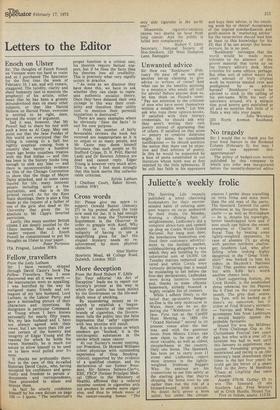Unwanted advice
Sir: How can ' Bookbuyer ' (February 10) pass off as new yet another set-up claiming to give advice to writers of verse? And what can be the benefits accruing to a neophyie who sends off stuff for advice? Before anyone does so, let him think on Pound's tenet: "Pay not attention to the criticism of men who have never themselves written a notable work." Let him ask who runs these opinion-kiosks. If satisfied with their literary , credentials, he should ask why they aren't writing their own poetry instead of appraising that of others. If satisfied on that score — penury or creative doldrums might, by • some, be considered justifications — he should question the notion that there can be objective and final arbiters of poetry. In this he would be supported by a host of poets established in our literature whose work was at first rejected by the little ephemeras. If he still has faith in his appraisers and buys their advice, is the resulting work his or theirs? Acceptance of the implied standardisation and profit-motive in 'marketing advice' for the verse-writer should lead him at least to this knowledge for his £3; that if he can accept this horsemanure, he is no poet.
' Bookbuyer ' envisages that the world would be made more tolerable by the absence of the poorer material that turns up on the literary editor's desk. More tolerable for some editors, perhaps. But what sort of editor wants the small amount of truly original work he receives mauled over and predigested by an advice bureau? Bookbuyer ' would be advised to stick to the calling of his pen-name. With his sort of ignorance around, it's a miracle that good poetry gets published at all and no surprise that little of it finds a way into your pages.
John Wareham 235 North Avenue, Southend, Essex
































 Previous page
Previous page